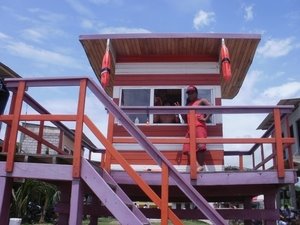
One of the saddest stories I heard while traveling through Central America was in Costa Rica.

We lived in a small tourist (yet with plenty of expats) town – Montezuma on the Nicoya Peninsula – for a month and there was a lovely small cove out front our rented apartment on the beach.
There was also a trickle of a river that emptied into it, that I learned contained sewage from housing up above, so swam only a few times in that area of the ocean.
I also learned that there were strong currents at times, and some folks had been carried out to sea and drowned.

During one of my swims, I felt myself being pulled out… head up, look to shore, swim like hell parallel to shore. Head up again, still being pulled, swam harder. My only time in my life I’ve had to put that swimmers safety knowledge to the test; thankfully it worked.
Many other swimmers aren’t so lucky. A few months before our arrival, a young couple on their honeymoon were staying in the town. There was a rocky outpost on one edge of the cove, with waves crashing at high tide, at low tide a lovely place to wander around.
The couple were out on the rocks during a stormy moment, ocean waves crashed hard against the rocks, and they were both taken out to see and drowned. Tragic and sad.
Coming from the United States that statement is pretty clear, but in Latin America they really don’t think that way, nor have the resources (and care and concern) to provide safety on public beaches.
See the lifeguard stand above that was just ouside our hostal a block away? It rarely had lifeguards, and during Christmas/New Years high season that we stayed in the town I heard of five drownings.
Folks (mainly Ecuadorian) got drunk, did not know how to swim, went in the water and drowned.
When we were in Mancora beach a few months before, another drowning. A Japanese man who hardly knew how to swim, went too far out and drowned. Lifeguards were around, but didn’t see it until it was too late. His wife and small child were on the shore watching.
The awesome teen and I talked about it later, expressing empathy for the woman and child who lost their husband and father, and acknowledging the power of the ocean and how safety rules need to be respected. I think a big hug was exchanged as well.
On the road things are not like they are back home, and you see and hear things at times that are heart-breaking, just like back at home. Appreciate your life as you have it, wherever you may be.
